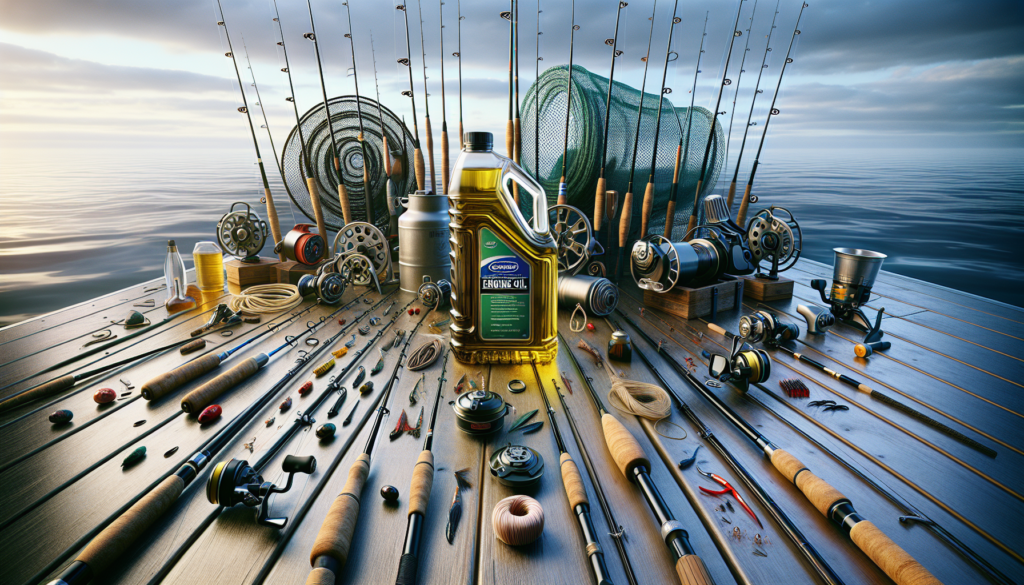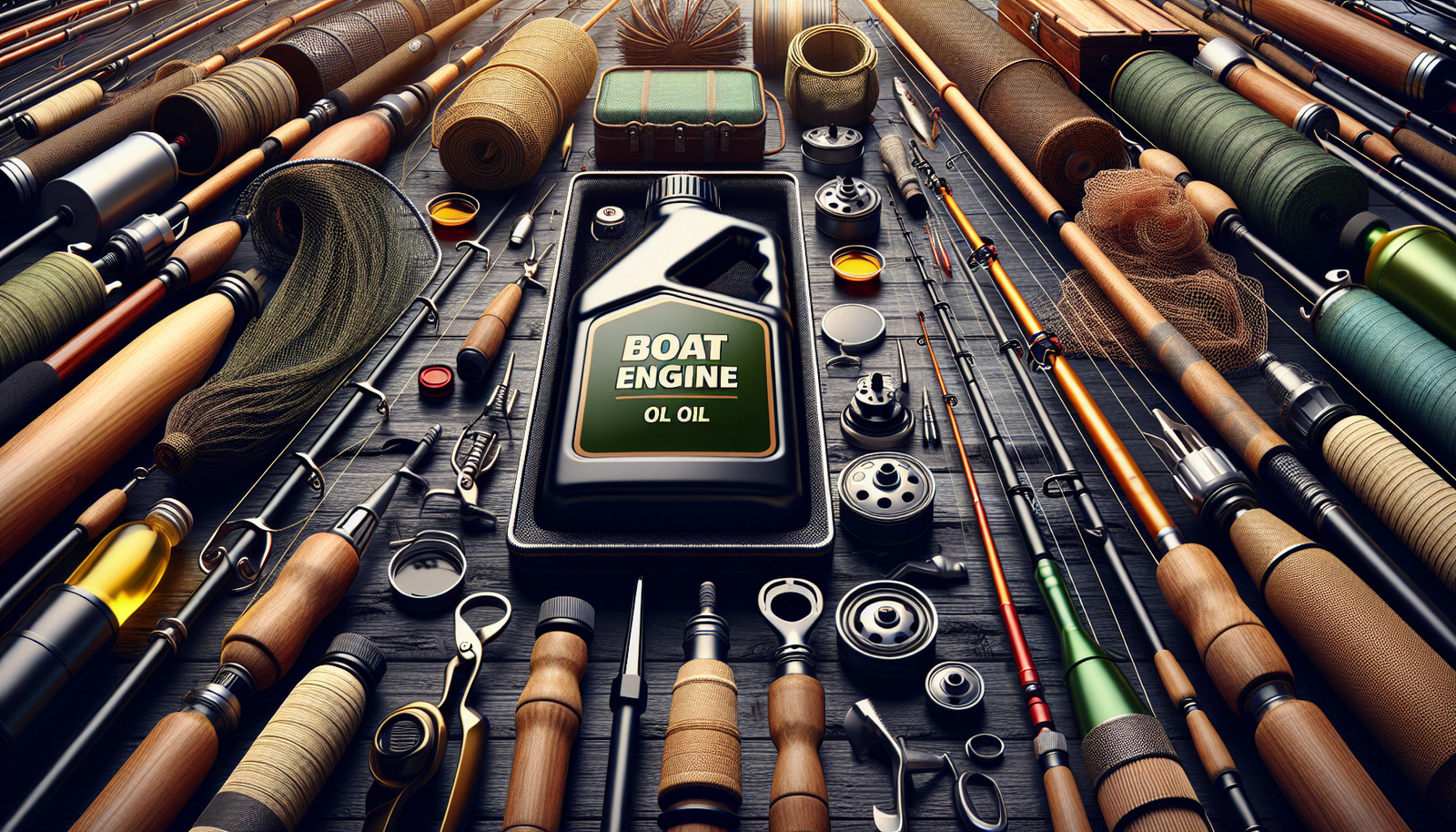Embarking on a fishing adventure calls for much more than just throwing your lines in the water – it is about making sure every part of your journey goes as smoothly as possible. Yes, that includes ensuring your boat’s engine works flawlessly. It’s surprising how the choice of boat engine oil can significantly impact your fishing expedition. “How To Choose The Right Boat Engine Oil For Your Fishing Adventures” is your comprehensive guide to finding the ideal oil for your boat’s engine. This article provides indispensable knowledge about the different types of oils available, their specific uses, and how to make an informed decision based on your boat’s model and your fishing requirements. So, buckle up, and prepare to give your fishing adventure a smooth ride!

Understanding the Importance of Engine Oil
A crucial element of your boat’s performance and longevity is the engine oil you use. Choosing the right one not only enhances the functionality but also mitigates potential damages. Understanding its significance will help you make the best decision for your fishing vessel.
Role of Engine Oil in Boat Performance
Engine oil fuels your boat’s heart – the engine. It ensures smooth operations, reduces heat production through friction reduction, and maintains cleanliness by flushing out residue and pollutants. Just like you wouldn’t use cheap fuel in a performance sports car, your boat’s performance could suffer if you aren’t using the right engine oil.
Impact on Engine Longevity and Efficiency
Every time you turn the engine on, it undergoes wear and tear. Over time, this can lead to significant damage. Oil serves as a lubricant, preventing excessive friction and reducing wear. That’s why using the right engine oil can significantly extend your engine’s lifespan and maintain its efficiency over the years.
Importance In Cold Weather Fishing
For cold weather fishing, the importance of engine oil cannot be overstated. It ensures that your boat’s engine can start in cold weather and operate efficiently without faltering. An appropriate oil maintains its viscosity even at low temperatures, providing the necessary lubrication to keep the engine running smoothly.
Types of Boat Engine Oils
There are primarily three types of engine oils – mineral, synthetic, and semi-synthetic. Each type has its advantages and disadvantages, making them suitable for different circumstances.
Distinguishing Between Mineral, Synthetic, and Semi-Synthetic Oil
Mineral oil, a product of crude oil refining, is the traditional type used for many decades across different types of engines. On the other hand, synthetic oil is engineered for better performance and greater resilience. Semi-synthetic oil combines the best of both – the cost effectiveness of mineral oil and the performance benefits of synthetic oil.
The Advantages and Disadvantages of Each Type
Mineral oil is cheaper but requires more frequent changes and is less resilient in extreme conditions. Synthetic oils are more durable, reduce engine wear, and better manage high temperatures – but are pricier. Semi-Synthetics, although costlier than mineral oil, provide a blend of the benefits of mineral and synthetic oils.
Considering Your Type of Boat Engine
Your boat’s engine type largely determines the oil you should use. Two-stroke and four-stroke engines require different oils due to their unique operating mechanisms. Also, inboard and outboard motors may require different considerations.
Oil Requirements for Different Types of Engines
Two-stroke engines require oil to be mixed with the fuel because they lack an oil sump for lubrication. Four-Stroke engines, on the other hand, have separate compartments for fuel and oil and do not need oil in their fuel. These differences result in distinct oil requirements for these engines.
Understanding Two-Stroke and Four-Stroke Engines
In two-stroke engines, every other revolution is a power stroke, resulting in a high power-to-weight ratio. In these cases, you need a low ash oil to prevent plug fouling and pre-ignition. Conversely, four-stroke engines have one power stroke for every four, requiring oils that can withstand high heat and pressure.
Special Considerations for Inboard and Outboard Motors
For inboard engines, check if your motor requires FC-W-rated oil, designed specifically for four-stroke marine engines. Outboard engines, being directly exposed to the healing effects of water, tend to run cooler, reducing oil viscosity needs. However, oil for outboard motors should have a rust inhibitor due to their exposure to water.
Assessing Your Boat Engine’s Age
The age of your engine plays a significant role in determining the type of oil you should use.
The Impact of Engine Age on Oil Requirements
Older engines often have more wear and tear and may benefit from thicker oil to seal potential leaks and dampen engine noise. On the other hand, newer engines typically operate better with thinner oil for optimal fuel efficiency.
Older vs. Newer Boat Engines and Oil Choices
For older engines, consider oils formulated with high-zinc content for better protection against wear. In contract, newer engines can benefit from full-synthetic oils that enhance efficiency and performance.

Understanding Viscosity Grades
Viscosity – the oil’s resistance to flow – is a key factor you need to understand. Depending on your boating environment, you’ll need to choose the appropriate oil viscosity.
The Meaning of Viscosity Ratings
The viscosity rating of an oil represents its thickness or ‘stickiness’ at a specific temperature. The two values in a viscosity rating, such as 10W-30, represent the oil’s thickness when cold and when hot, respectively.
Choosing Viscosity Based on Weather Conditions
For cold weather, lower viscosity oil is preferable as it flows more easily, ensuring startup protection. In warmer climates, opt for higher viscosity oils that won’t thin out excessively with heat.
Impact of Viscosity on Engine Performance
Viscosity directly influences the fuel efficiency, performance, and longevity of your engine. Using the right viscosity results in optimal lubrication, which reduces friction, minimizes wear, and maximizes fuel efficiency.
Analyzing Your Fishing Environment
The environment in which you fish – freshwater, saltwater, warm, cold, high altitude – can affect your choice of engine oil.
The Impact of Saltwater vs. Freshwater on Oil Selection
Saltwater is more corrosive than freshwater and can infiltrate the engine, affecting its performance. In such conditions, consider oil with additives that protect against corrosion.
How Temperature and Climate Affect Your Oil Choices
Harsh winters demand oils with lower viscosity for easy cold starting, while summer fishing may require higher viscosity oils to remain stable under intense heat. The performance of oil varies with climatic conditions, so adjust your choice accordingly.
Special Considerations for High-Altitude Fishing
High altitudes can affect the performance of your boat’s engine – especially since air density decreases as altitude increases. As this affects the fuel-air mixture, engines sometimes require special oil additives to help manage these conditions.
Assessing Oil Brands and Quality
While selecting engine oil, it’s essential to choose reputable brands known for their consistent quality.
Choosing Reputable and Reliable Brands
Reputable brands undertake rigorous testing to ensure their oil meets or surpasses industry standards. They’ve built their reputation on maintaining high quality and performance, making them a safer bet than less-known brands.
Understanding Oil Additives and Their Benefits
Additives enhance the performance of oil and protect your engine. They include detergents for cleaning, dispersants to evenly distribute contaminants, antioxidants to prevent oil thickening, all aiming to enhance engine performance and longevity.
Evaluating the Importance of Engine Oil Standards and Certifications
Check for standard certifications like NMMA, API, or ILSAC on the oil packaging. These ensure the oil was tested thoroughly and meets the necessary industry standards.
Understanding the Maintenance Schedule and Oil Change
Knowing when to change your engine oil is crucial in maintaining your boat engine’s effectiveness over time.
Identifying Your Engine’s Oil Change Interval
Check your engine manufacturer’s guidelines for oil change intervals. This information is crucial since oil gradually loses its efficacy over time, necessitating a fresh change to prevent engine deterioration.
The Role of Regular Maintenance in Engine Longevity
Regular maintenance, including engine oil checks and changes, prevents potential engine problems, enhances performance, and extends your engine’s lifespan.
What to Consider When Changing the Boat Engine Oil
When changing your boat engine oil, consider the type of oil, its viscosity, and additive content. Also, consider the environmental factors where you’re fishing, your boat’s engine design, and its age.
Cost Considerations for Boat Engine Oils
While cost is undoubtedly an important factor, remember that cheaper isn’t always better. The price you pay for high-quality oil could save you costlier repairs in the future.
Comparing Cost and Quality of Engine Oils
While synthetic oils often cost more than traditional mineral oils, the former offer better protection due to enhanced performance characteristics. Therefore, it’s worth considering the better quality over initial cost.
The Long-term Financial Benefits of High-Quality Oil
High-quality oils can contribute to fewer engine problems, less frequent oil changes, and longer engine life. Though they may cost more initially, they might save you money in the long run by reducing maintenance and repair costs.
Conclusion: Selecting the Ideal Boat Engine Oil
When it comes to choosing the right boat engine oil, adequate knowledge and consideration of various factors are crucial.
Final Checklist for Choosing Boat Engine Oil
Consider the boat’s engine type, the environment in which you fish, oil types and viscosity, your budget, and the age of your engine. You should also consider the brand of the oil and the regular maintenance schedule of your engine.
Adjusting as Your Boat and Fishing Conditions Change
Remember, as your boat ages, or if you change fishing environments or seasons, your choice of oil should change accordingly. Ultimately, being flexible and making educated choices will ensure the longevity and performance of your boat’s engine. Happy fishing!


[…] the exterior but extends to caring for the engine as well. A major component in this care involves choosing the right engine oil. It plays a direct role in the performance and longevity of the […]